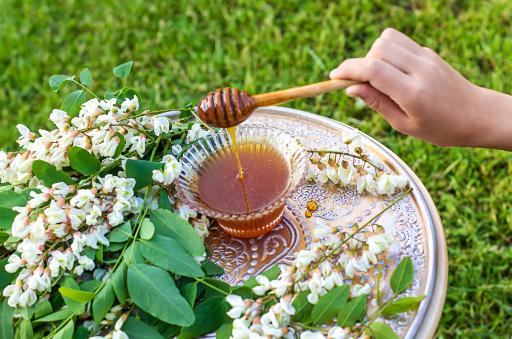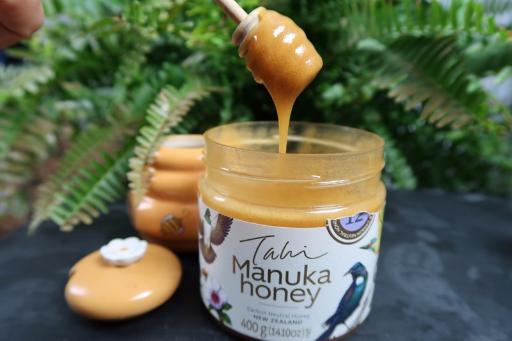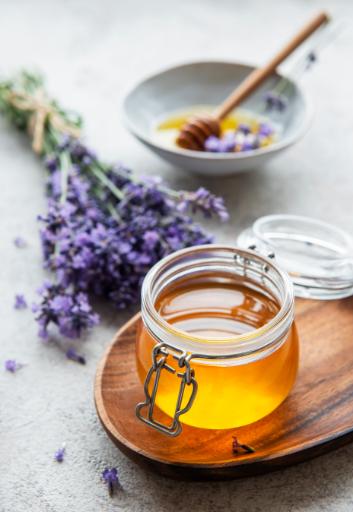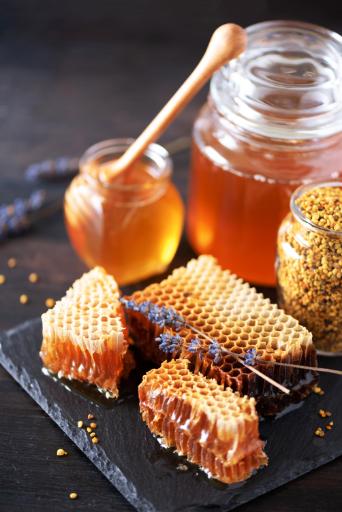Honey, often referred to as nature’s liquid gold, has been adored since time immemorial for its enchanting sweetness and astounding health benefits. From the aromatic fields of lavender to the lively orange groves, each honey variant encapsulates the essence of the flowers visited by the bees. Let’s embark on a journey to explore the unique flavors and health benefits of Multifloral, Acacia, Manuka, Clover, Orange, and Lavender honey that cater to everyone, from the energetic youth to the tranquil seniors.
Multifloral Honey: A Symphony of Flavors

Multifloral honey, also known as multiflower or polyfloral honey, is a delightful blend of nectars from different blossoms. This honey is a testament to the bees’ remarkable journey, collecting nectar from a myriad of flowers, resulting in a unique taste and color that varies based on the location and season.
The bees, with their proboscis, gather nectar from various flowers and store it in their honey stomach. Here, enzymes begin to break down the complex sugars. Back at the hive, the nectar is passed from bee to bee, further breaking down the sugars and eventually deposited into honeycomb cells. The bees then fan their wings to evaporate excess water, thickening the honey before sealing the cells with beeswax.
Multifloral honey offers a plethora of benefits for all ages:
- For Kids: It acts as a natural energy booster and supports a healthy heart, stomach, and digestive system. It’s also used to treat upper respiratory infections and can be a mild and healthy alternative to processed sugar.
- For Adults: It’s packed with antioxidants and anti-inflammatory properties, which can help reduce the risk of chronic diseases, support heart health, and promote better sleep. It’s also beneficial for wound healing and managing cholesterol and blood pressure levels.
- For Seniors: The antioxidants in multifloral honey can aid cognitive health and memory. Its anti-inflammatory effects can help with conditions like arthritis, and it’s also known to promote better sleep, which is crucial for overall health in older adults.
Remember, while honey offers many health benefits, it should be consumed in moderation as part of a balanced diet.
Acacia Honey: The Transparent Delight

Acacia honey, also known as locust honey, is a unique variety produced by bees that pollinate the flowers of the black locust tree, native to North America and Europe. It’s known for its light color, and almost transparent appearance and it remains liquid longer due to its high fructose content.
Nutritionally, acacia honey is rich in carbohydrates, primarily sugars like glucose, sucrose, and fructose, with fructose being the most prevalent. It contains small amounts of vitamins and minerals, such as vitamin C and magnesium, but its most notable feature is its high content of antioxidants, particularly flavonoids.
The health benefits of acacia honey include:
- Antioxidant-rich: Protects cells against damage from free radicals, which may reduce the risk of chronic diseases like heart disease and certain cancers.
- Antibacterial properties: This may help with wound healing and reduce bacterial resistance, particularly in chronic kidney disease.
- Anti-inflammatory: This can aid in reducing inflammation, which is beneficial for conditions like arthritis.
It’s also used as a natural sweetener due to its mild flavor, making it a popular choice for sweetening beverages and foods without altering their natural taste. However, like all types of honey, acacia honey is high in sugar and should be consumed in moderation.
Manuka Honey: The Potent Healer from New Zealand

Manuka honey is a unique type of honey native to New Zealand, known for its potent antibacterial and antiviral properties. It’s produced by bees that pollinate the flower Leptospermum scoparium, commonly known as the Manuka bush. The key component that sets Manuka honey apart is methylglyoxal (MGO), which is derived from dihydroxyacetone (DHA) found in the nectar of Manuka flowers. The higher the concentration of MGO, the stronger the antibacterial effect.
Here are some of the benefits of Manuka honey:
- Wound Healing: It’s effective in treating burns, ulcers, and non-healing wounds. It can combat antibiotic-resistant strains of infections, such as MRSA.
- Oral Health: It attacks harmful oral bacteria associated with plaque formation, gum inflammation, and tooth decay.
- Cough Relief: Manuka honey can soothe coughs due to upper respiratory tract infections (URTIs).
- Digestive Health: It may improve digestion and protect against ulcers.
- Skin Care: It’s used to treat acne and promote skin health.
Manuka honey is also rich in antioxidants and has anti-inflammatory effects, making it beneficial for overall health maintenance. However, it should be noted that while Manuka honey has many health benefits, it should be used responsibly and not as a substitute for professional medical advice or treatment.
Clover Honey: The Classic Favorite

Clover honey is a popular type of honey that comes from the nectar of clover plants. It’s known for its sweet, mildly floral taste and light color, making it a favorite among honey enthusiasts. Here’s a brief overview of its characteristics and benefits:
Characteristics of Clover Honey:
- Taste: Sweet, with a mild floral flavor.
- Color: Light, ranging from white to light amber.
- Consistency: Thick and smooth; remains liquid longer due to high fructose content.
- Nutritional Content:
- Calories: Approximately 60 calories per tablespoon.
- Carbohydrates: Mostly natural sugars like glucose and fructose.
- Vitamins and Minerals: Contains small amounts of magnesium, potassium, iron, and zinc.
- Antioxidants: Rich in compounds that can prevent or reduce cellular damage.
Health Benefits:
- Antiviral and Antibacterial: Effective against harmful bacteria and viruses, including Staphylococcus aureus.
- Wound Healing: Can be used as an antibacterial dressing for burns, scratches, and diabetic foot wounds.
- Cough and Sore Throat Relief: Its anti-inflammatory properties make it a natural remedy for coughs and sore throats.
It’s important to note that while clover honey has health-promoting properties, it should be consumed in moderation due to its high sugar content. For the maximum health benefits, opt for raw and unfiltered clover honey.
Orange Honey: The Citrus-Kissed Delight

Orange honey, often called orange honey, is a delightful variety of honey that bees produce from the nectar of orange tree blossoms. Orange honey is particularly popular in regions where orange groves are abundant, such as Florida, California, and Texas.
Characteristics of Orange Honey:
- Taste: It has a sweet and slightly citrusy flavor, which many find refreshing and enjoyable.
- Aroma: The honey is noted for its fresh, delicate citrus scent.
- Color: Typically light amber, with a clear to slightly golden hue.
- Consistency: It tends to remain liquid for a longer time due to its high fructose content.
Health Benefits:
- Antioxidants: Orange blossom honey is rich in antioxidants like quercetin and hesperetin, which may provide anti-inflammatory, anti-allergy, and anti-cancer benefits.
- Digestive Aid: It can help improve digestion and reduce the severity and duration of diarrhea.
- Antibacterial: The honey has natural antibacterial properties, making it beneficial for wound healing and fighting infections.
- Cough Relief: Recognized by the World Health Organization as a natural cough remedy, it can alleviate cold and cough symptoms.
- Skin Health: Its antibacterial nature also makes it useful for improving skin conditions, such as acne.
When purchasing orange blossom honey, it’s recommended to look for products labeled “raw and unfiltered” to ensure you’re getting all the natural benefits, as processing can strip honey of its nutrients. Remember, while honey offers many health benefits, it should be consumed in moderation as part of a balanced diet.
Lavender Honey: The Soothing Floral Elixir

Lavender honey is a monofloral variety made from the nectar of lavender flowers. It’s known for its delicate, sweet flavor with floral notes and a hint of citrus-earthy aftertaste. The color is typically a clear, very light yellow with golden undertones, and it crystallizes over time, turning a paler yellow-beige.
Health Benefits of Lavender Honey:
- Antibacterial and Antiseptic: It has natural antibacterial properties that can help prevent and fight infections.
- Antioxidants: Lavender honey is rich in antioxidants, which can help reduce inflammation and protect against free radical damage.
- Digestive Aid: It can support digestive health and may help with issues like indigestion.
- Soothing Properties: Known for its calming effects, it can be beneficial for anxiety and promoting better sleep.
Lavender honey can be enjoyed in various ways, such as drizzled over biscuits, stirred into tea, or used as a natural sweetener in recipes. It’s also used externally to soothe skin irritations and as a component in natural skincare products.
Remember to consume honey in moderation as part of a balanced diet, and if you have allergies to bee products or pollen, consult with a healthcare provider before consuming any honey.
Conclusion
The world of honey is as diverse as it is beneficial. Whether it’s the multifaceted multifloral honey, the delicate Acacia, the potent Manuka, the classic Clover, the citrus-kissed Orange, or the soothing Lavender,







